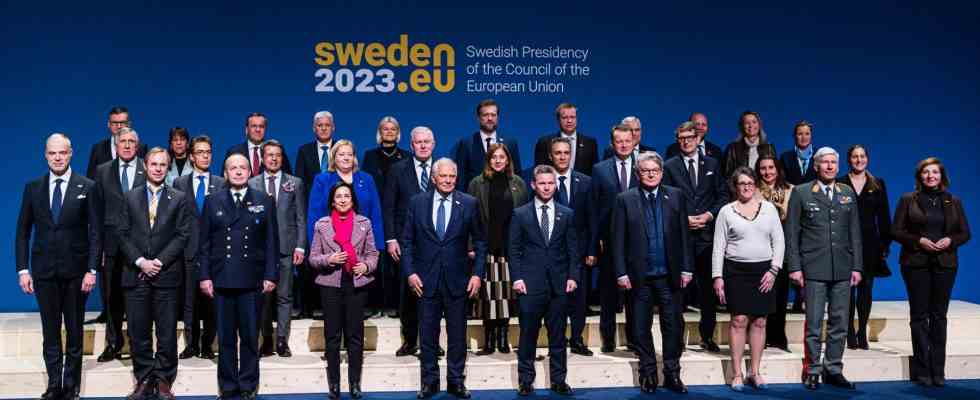Status: 08.03.2023 6:29 p.m
The EU is short on ammunition and will remain so for the time being. At the meeting of the defense ministers, there were only suggestions – there were no concrete solutions. Ukraine, meanwhile, is demanding a million projectiles.
At the meeting of EU defense ministers in Stockholm, the issue of the lack of ammunition was at the top of the agenda. The European Union has promised Ukraine more ammunition in the fight against the Russian attackers – but it is unclear where it will come from.
“We will act quickly to meet Ukraine’s ammunition needs,” Swedish Defense Minister Pal Jonson promised after the meeting. The EU foreign policy chief Josep Borrell spoke of a “basic agreement on a procedure”. But there are still a number of unanswered questions, he admitted.
Ukraine wants a million bullets
The Ukrainian Defense Minister Oleksiy Reznikov also took part in the meeting. He demanded one million projectiles worth four billion euros so that Ukraine can continue to defend itself. Backing came from Estonia. “In order to help Ukraine, the EU needs fresh money, and fast,” said Defense Minister Hanno Pevkur.
EU chief diplomat Borrell suggested initially providing one billion euros from the European peace fund to buy grenades for Ukraine from its own stocks. After all, according to Borrell, “the money doesn’t just fall out of the sky because an EU country wants it.”
Breton: “War economy mode”
However, money does not seem to be the EU’s biggest problem – but rather capacity. Around 300,000 artillery shells with a caliber of 155 millimeters are currently manufactured in Europe every year – as many as the Ukrainian army fires in 12 weeks. In order to boost production, Borrell wants to centrally control the purchase of ammunition and mobilize further EU funds.
According to EU Commissioner Thierry Breton, the armaments industry should switch to “war economy mode” in order to ramp up its capacities. A formulation that German Defense Minister Boris Pistorius considers problematic. “I definitely don’t adopt the concept of the war economy as my own,” he says. “The European Union, Germany – we are not at war.”
Pistorius for supporting the industry
On the other hand, Pistorius considers Breton’s proposal, who is also responsible for armaments in the EU, to support the defense industry with funding when ramping up ammunition production worth considering – even though the companies are currently piling up orders.
“Indeed, the armaments industry is making real money right now, that’s macabre, but that’s how it is in times of war, then demand increases and then sales also increase. That’s why it’s all the more important that we react flexibly now,” said he. His talks with the armaments industry showed that they were very willing to take pre-production measures before contracts were signed. “I think that’s also very important.”
The so-called Jumbo Council, the group of foreign and defense ministers, will deal with the proposals in 14 days. Then the plans could be finalized and decided.

